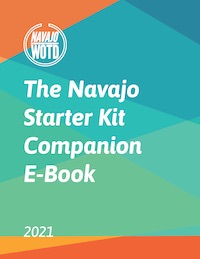ak'éí 1
relatives and family
uk kay
Yá’át’ééh shik’éí dóó shidiné’é. (Greetings my relatives and my people.)
This is a more formal, yet intimate, way of greeting a large group. It’s part of an introduction that commonly precedes a speech, or address, of some sort.
Ak’éí, and most nouns that are preceded by a-, is a non-possessive from of “relatives” and “family.” Add shi/ni/bi/nihi/etc. to say my/your/his (or her)/our (their) family.
Here are a few elder family terms that are useful to know:
- amá – mother
- azhé’é – father
- amá sání – maternal grandmother
- acheii – maternal grandfather
- análí asdzą́ą́ – maternal grandmother
- análí hastiin – paternal grandfather
In combination with the Diné (Navajo) clan system, these words can extend outside the immediate family. For example, if a woman’s second clan (her father’s clan) were the same as another man’s first clan (his mother’s clan), she calls him her older/younger father depending on his age relative to her own father’s age. There are many unique relationships that arise from this system.
Original post date: .
